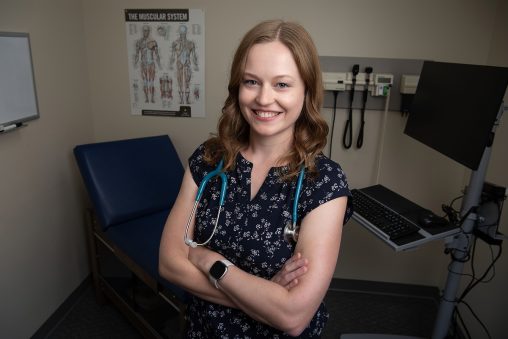
Mariah Jansing is the first student to complete Wright State’s newly accredited Doctor of Nursing Practice program in the School of Nursing. (Photo by Erin Pence)
Mariah Jansing recently made history at Wright State University — and her achievement could help more female students, particularly those from international backgrounds, feel comfortable undergoing cervical cancer screenings.
Jansing is the first student to complete Wright State’s newly accredited Doctor of Nursing Practice program in the School of Nursing.
“It’s a great honor, truly. It took so much work and time and effort, and the final project was such a labor of love,” said Jansing, who previously earned a Bachelor of Science in Nursing from Wright State and a Master of Science in Nursing, Family Nurse Practitioner, from the University of Cincinnati.
Her doctoral research aimed to improve cervical cancer screening rates among international students, an issue she recognized while working as a nurse practitioner in Student Health Services at Wright State Physicians Health Center.
She noticed that many international students, especially women from South Asian countries, were unfamiliar with the purpose of a Pap smear or what the procedure involved.
“It was becoming an issue at the clinic,” she said. “There was a lot of hesitation from international students, a lot of fear, not knowing what to expect. Some were bewildered to find out what it involves.”
Women in South Asia experience some of the highest rates of cervical cancer in the world, she said, and screening is not a cultural norm in those countries. If detected early, cervical cancer can be treated effectively or cured. In the United States, women are encouraged to begin screenings at age 21.
For her project, Jansing developed a three-part educational intervention: written materials, a video explaining the procedure and verbal counseling about the importance of screening.
She said the approach has the potential to increase screenings among international students.
“This will help to empower them to take steps toward preventative health care and take steps to manage their health,” she said.
Wright State previously offered a Doctor of Nursing Practice degree in partnership with the University of Toledo, but that consortium ended about five years ago. Tonya Schmitt, D.N.P., assistant professor of nursing and director of the program, launched Wright State’s independent doctoral program after working on the consortium.
The program earned accreditation earlier this year from the Commission on Collegiate Nursing Education through the American Association of Colleges of Nursing.
It focuses on evidence-based advanced nursing practice and prepares graduates to deliver care at the highest level, with emphasis on informatics, population health, and interprofessional education and collaboration.
“At Wright State, we understand the needs of the future of health care,” Schmitt said. “We understand the importance of preparing students at the highest level possible.”
This fall, Jansing will join Wright State’s School of Nursing as a clinical instructor and coordinator of the family nurse practitioner track, while continuing to work one day a week at Student Health Services.
She hopes to inspire the next generation of nurses.
“Nursing is so much more than just a job — it’s a passion,” she said. “It’s a privilege to care for others when they are at their most vulnerable. As nurses, you have the incredible power to profoundly impact every patient you encounter.”

 Wright State faculty member Damaris Serrano wins Panamanian literary award
Wright State faculty member Damaris Serrano wins Panamanian literary award  Wright State grad Hannah Beachler earns Oscar nomination for production design on ‘Sinners’
Wright State grad Hannah Beachler earns Oscar nomination for production design on ‘Sinners’  Wright State alum Emily Romigh builds on a family legacy in education
Wright State alum Emily Romigh builds on a family legacy in education  Wright State receives $3 million grant to strengthen civic literacy and engagement across Southwest Ohio
Wright State receives $3 million grant to strengthen civic literacy and engagement across Southwest Ohio  Fitness Center renovation brings new equipment and excitement to Wright State’s Campus Recreation
Fitness Center renovation brings new equipment and excitement to Wright State’s Campus Recreation 